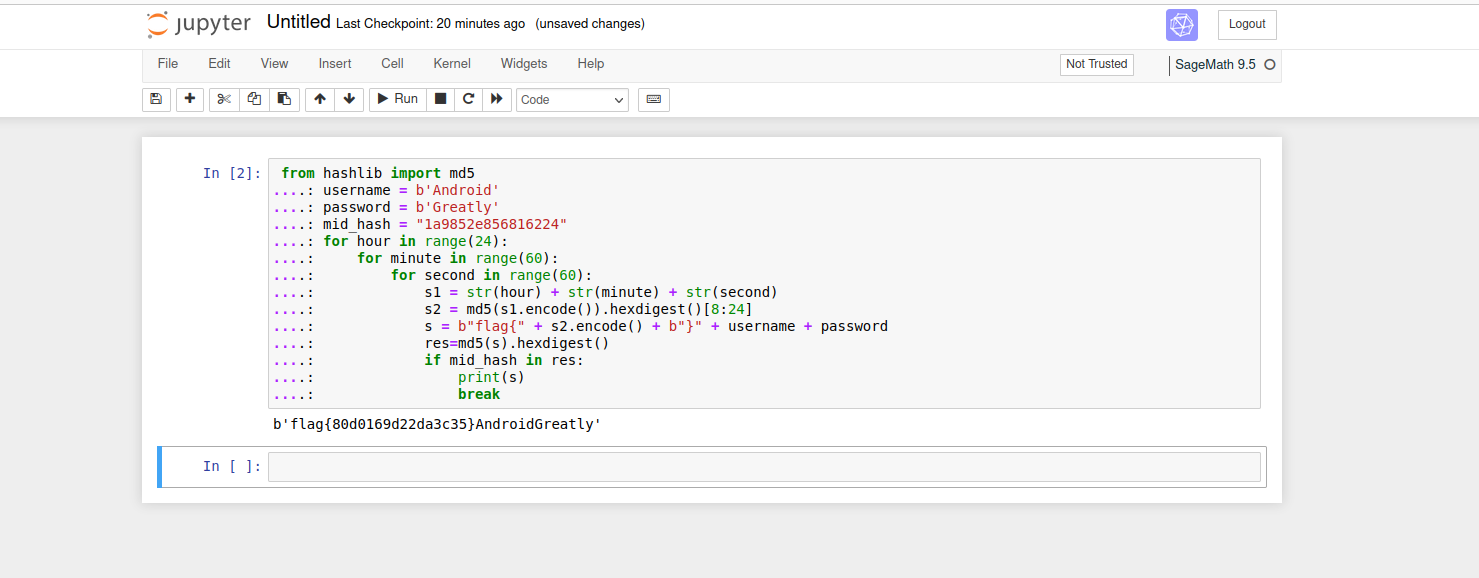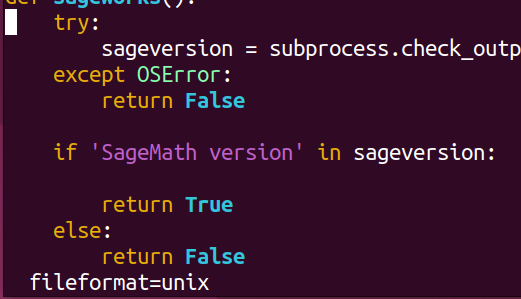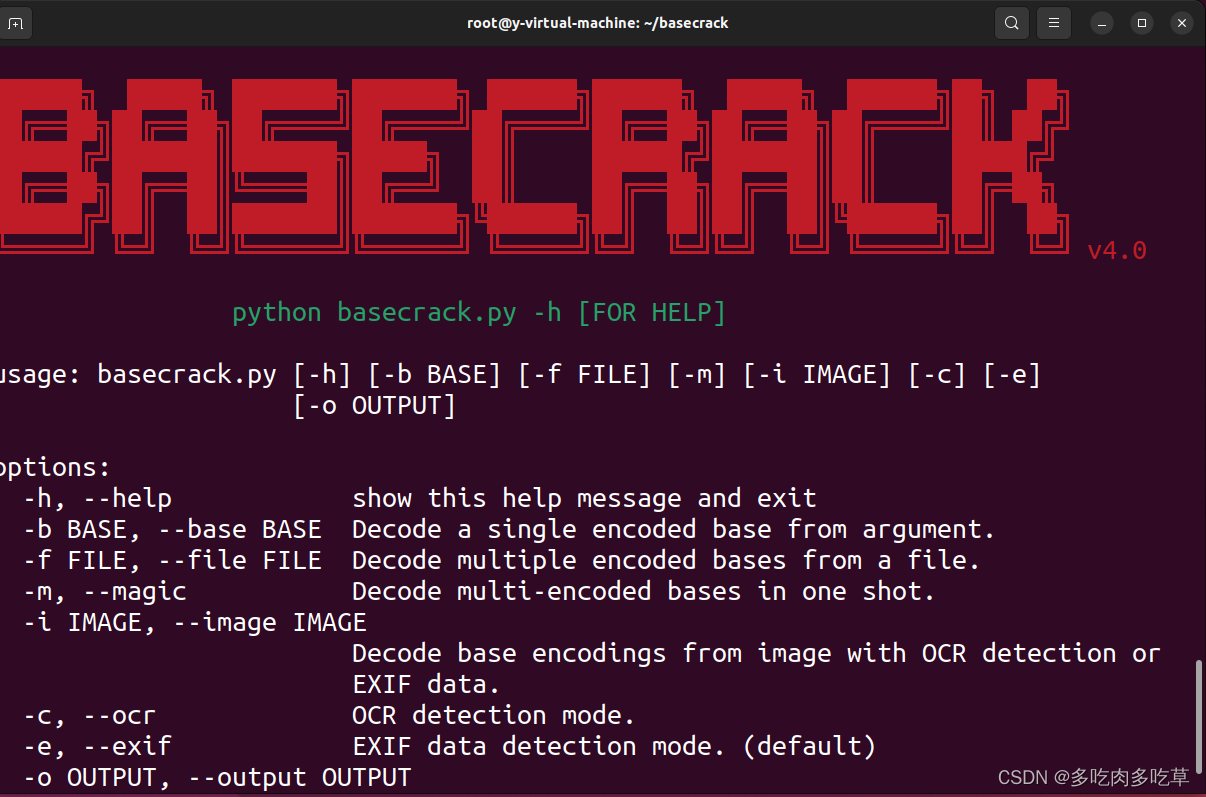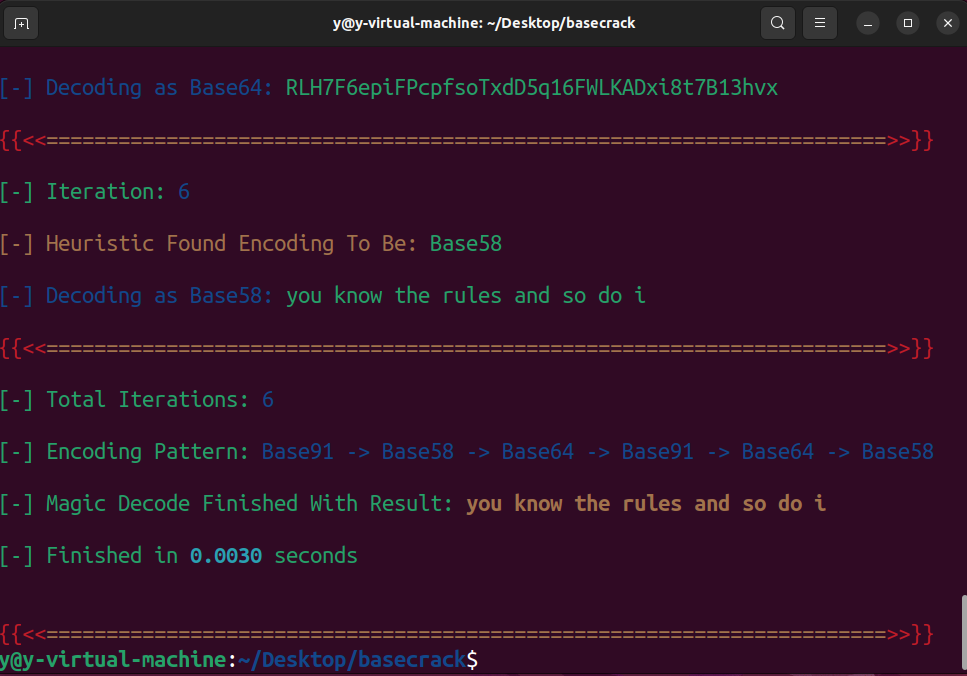前言
在Ubuntu实践Github上几种热门的密码学工具,帮助CTFer有效实战。
Ubuntu
本文Ubuntu版本22.04,默认python版本3.10,自带openssl
Ubuntu22.04多个python版本切换
某些工具,比如ciphey,不能在python3.10上使用,所以需要在ubuntu内置多个python版本切换使用。
本文采用annaconda来管理python版本。
#创建虚拟环境,envx.x(虚拟环境名称)
conda create -n envx.x python=X.X(3.6、3.7等)
'''
如出现 WARNING: A newer version of conda exists.
则输入以下命令
conda clean --packages --tarballs #清除conda
conda update --all #更新conda
创建过程中出现 Proceed ([y]/n)?
即:是否确认将默认环境的包导入进虚拟环境中
'''
#激活虚拟环境
source activate envx.x
#退出虚拟环境
source deactivate envx.x
#删除虚拟环境
conda remove -n envx.x --all
#查看安装了哪些包
conda list
'''
可以在已激活的虚拟环境中安装一个包并查看,退出环境后,
再次查看默认环境的包,自行对比确认虚拟环境创建完成
'''
#查看当前存在哪些虚拟环境
conda env list

Sagemath
Sage基于并使用Python,Python程序可以在Sage中直接运行,也可以在Sage中使用Python的各种库。sage是Crypto学习者的利器。
安装
打开software即可安装。
但这里还是有换源的问题。

笔者这里因为网速还ok,一直用的官方自带cn源。
在这里换源尝试一下

sudo apt update
sudo apt upgrade
即可安装成功
①
在Ubuntu里打开后会自动在本地搭建一个Jupyter Notebook,自动弹出浏览器访问,本地访问对应的url。

可以直接打开对应sage或者python脚本进行编辑,但是不能运行。可以new一个python3或者sage的notebook来编写、调试、运行代码。
也可以在此处下载包。
②
在terminal运行脚本
sage xxx.py

③
将sage导入python脚本
可以在Python脚本中将Sage作为库导入。
注意:需要使用与Sage捆绑的Python版本(当前为python3.10.6)运行该Python脚本。要导入Sage,需要在Python脚本中添加以下内容:
**from****sage.all****import** *
若想运行脚本,
如②中
**python hi.sage.py**
运行报错,但
**python hi.sage**
可以运行
# This file was *autogenerated* from the file hi.sage
from sage.all_cmdline import * # import sage library
print('hi')
需要使用该选项调用Sage -python 它将使用Sage附带的Python版本运行脚本。
例如,如果Sage在你的 PATH 变量,则可以执行以下操作:
sage -python /path/to/my/script.py
另一种方法是编写Sage脚本并使用Sage本身运行该脚本。Sage脚本具有文件扩展名 .sage 和或多或少是一个Python脚本,但使用Sage特定的函数和命令。然后可以运行Sage脚本,如下所示:
sage /path/to/my/script.sage
这将负责加载必要的环境变量和默认导入。
Ciphey
自动化大量解密和解码的工具,例如多个基本编码,经典密码,哈希或更高级的加密,同时也支持自定义算法。据说比cyberchef更强。
日常在CTF中,偶尔会碰到一些不能一眼看出编码规则的字符串,这些字符串的编码规则或许并不复杂,但由于有限的知识面和脑洞并不能马上解码,严重影响效率。
安装过程中需要注意此工具对python版本的要求。
安装完成后,开箱即用
1.文件输入ciphey -f encrypted.txt
2.非限定输入ciphey -- "Encrypted input"
3.正常方式ciphey -t "Encrypted input"
例1:ctfshow crypto12

例2:ctfshow新手杯 easy_base

本例虽然不能给到完整的正确flag,但可以快速给到大致的flag样式来给选手提供思路。
实际上把TZ改为64即可提交flag。
最简洁路径:reverse—base64—flag
例3:base91+base32加密

CTF-RSA-tool
前提:需要安装python2.7
一款基于python以及sage的小工具,助不熟悉RSA的CTFer在CTF比赛中快速解决RSA相关的基本题型。
安装完成后,
python solve.py -h
符号链接
如不在项目目录下打开,可以做个符号链接,链接solve.py到bin目录下
ln -s /home/y/Desktop/CTF-RSA-tool/solve.py /usr/local/bin/rsa_solve
之后,就能直接在终端输入
rsa_solve -i rsa.txt
去快速秒简单题了
rsa.txt的编写规范参看
examples/input_example.txt
一行一个变量,可以写做 n = *** 或者 n is *** 或者 n : ***
识别的变量名有:n,e,d,c,p,q [用于特殊方法的:hbop(high bits of factor),pbits(bits lenth of p)]
不用区分大小写,如: n或者N都行
多组密钥要区分顺序,不过只需区分同变量名的顺序,如出现的顺序: n1,n2,e1,e2 和 n1,e1,n2,e2 等价
按照上述操作后,报错问题如下

查看文件格式为unix

本文暂且使用目录下运行方法
python solve.py -i rsa.txt
How does it work
根据题目给的参数类型,自动判断应该采用哪种攻击方法,并尝试得到私钥或者明文,从而帮助CTFer快速拿到flag或解决其中的RSA考点。
例1:2020-BJDCTF-Crypto-rsa_output
n=21058339337354287847534107544613605305015441090508924094198816691219103399526800112802416383088995253908857460266726925615826895303377801614829364034624475195859997943146305588315939130777450485196290766249612340054354622516207681542973756257677388091926549655162490873849955783768663029138647079874278240867932127196686258800146911620730706734103611833179733264096475286491988063990431085380499075005629807702406676707841324660971173253100956362528346684752959937473852630145893796056675793646430793578265418255919376323796044588559726703858429311784705245069845938316802681575653653770883615525735690306674635167111
e=2767
c=20152490165522401747723193966902181151098731763998057421967155300933719378216342043730801302534978403741086887969040721959533190058342762057359432663717825826365444996915469039056428416166173920958243044831404924113442512617599426876141184212121677500371236937127571802891321706587610393639446868836987170301813018218408886968263882123084155607494076330256934285171370758586535415136162861138898728910585138378884530819857478609791126971308624318454905992919405355751492789110009313138417265126117273710813843923143381276204802515910527468883224274829962479636527422350190210717694762908096944600267033351813929448599
n=21058339337354287847534107544613605305015441090508924094198816691219103399526800112802416383088995253908857460266726925615826895303377801614829364034624475195859997943146305588315939130777450485196290766249612340054354622516207681542973756257677388091926549655162490873849955783768663029138647079874278240867932127196686258800146911620730706734103611833179733264096475286491988063990431085380499075005629807702406676707841324660971173253100956362528346684752959937473852630145893796056675793646430793578265418255919376323796044588559726703858429311784705245069845938316802681575653653770883615525735690306674635167111
e=3659
c=11298697323140988812057735324285908480504721454145796535014418738959035245600679947297874517818928181509081545027056523790022598233918011261011973196386395689371526774785582326121959186195586069851592467637819366624044133661016373360885158956955263645614345881350494012328275215821306955212788282617812686548883151066866149060363482958708364726982908798340182288702101023393839781427386537230459436512613047311585875068008210818996941460156589314135010438362447522428206884944952639826677247819066812706835773107059567082822312300721049827013660418610265189288840247186598145741724084351633508492707755206886202876227

例2:费马分解(p&q相近时)

#!/usr/local/bin/python
# coding:utf-8
import argparse
from Crypto.PublicKey import RSA
import subprocess
import lib.RSAutils
import libnum
split_char_dic = ['=', ':', 'is']
# Check if sage is installed and working
def sageworks():
try:
sageversion = subprocess.check_output(['sage', '-v'])
except OSError:
return False
if 'SageMath version' in sageversion:
return True
else:
return False
def input_file(path):
multiple = False
with open(path) as dfile:
data = {}
data_lines = dfile.readlines()
for i in split_char_dic:
if i in data_lines[0]:
split_char = i
break
for k in data_lines:
if not k.strip():
continue
key = k.split(split_char)[0].strip().lower()
value = k.split(split_char)[1].strip()
value = long(int(value, 16)) if '0x' in value else long(int(value))
if key in data and value != data[key]:
if isinstance(data[key], list):
data[key].append(value)
else:
data[key] = [data[key], value]
multiple = True
else:
data[key] = value
return data, multiple
if __name__ == "__main__":
parser = argparse.ArgumentParser(
description='It helps CTFer to get first blood of RSA-base CTF problems')
# group1用于指定是否需要打印私钥及待解密的密文或者自动识别的文本
group1 = parser.add_mutually_exclusive_group(required=True)
# 密文可以指定密文文件,也可以指定它对应的十进制值
group1.add_argument(
'--decrypt', help='decrypt a file, usually like "flag.enc"', default=None)
group1.add_argument(
'-c', '--decrypt_int', type=long, help='decrypt a long int num', default=None)
group1.add_argument(
'--private', help='Print private key if recovered', action='store_true')
group1.add_argument(
'-i', '--input', help='input a file with all necessary parameters (see examples/input_example.txt)')
group1.add_argument(
'-g', '--gadget', help='Use some gadgets to pre-process your data first', action='store_true')
group2 = parser.add_argument_group(
title='some gadgets', description='Pre-process your data (with --gadget together)')
group2.add_argument(
'--createpub', help='Take N and e and output to file specified by "-o" or just print it', action='store_true')
group2.add_argument(
'-o', "--output", help='Specify the output file path in --createpub mode.')
group2.add_argument(
'--dumpkey', help='Just print the RSA variables from a key - n,e,d,p,q', action='store_true')
group2.add_argument(
'--enc2dec', help='get cipher (in decimalism) from a encrypted file')
# group3用于指定一个密钥pem文件 ,或指定需要的模数值
group3 = parser.add_argument_group(
title='the RSA variables', description='Specify the variables whatever you got')
group3.add_argument(
'-k', '--key', help='pem file, usually like ".pub" or ".pem", and it begins with "-----BEGIN"')
group3.add_argument('-N', type=long, help='the modulus')
group3.add_argument('-e', type=long, help='the public exponent')
group3.add_argument('-d', type=long, help='the private exponent')
group3.add_argument('-p', type=long, help='one factor of modulus')
group3.add_argument('-q', type=long, help='one factor of modulus')
# group4用于指定一特殊方法中所需要的额外参数
group4 = parser.add_argument_group(
title='extra variables', description='Used in some special methods')
group4.add_argument('--KHBFA', type=long,
help='use Known High Bits Factor Attack, this specify the High Bits of factor', default=None)
group4.add_argument('--pbits', type=long,
help='customize the bits lenth of factor, default is half of n`s bits lenth', default=None)
parser.add_argument(
'-v', '--verbose', help='print details', action='store_true')
args = parser.parse_args()
# if createpub mode generate public key then quit
if args.createpub:
if args.N is None or args.e is None:
raise Exception(
"Specify both a modulus and exponent on the command line. See --help for info.")
if args.output:
with open(args.output, 'w') as file:
file.write(RSA.construct(
(args.N, args.e)).publickey().exportKey())
print 'saved in %s' % args.output
else:
print RSA.construct((args.N, args.e)).publickey().exportKey()
quit()
# if dumpkey mode dump the key components then quit
if args.dumpkey:
if args.key is None:
raise Exception(
"Specify a key file to dump with --key. See --help for info.")
key_data = open(args.key, 'rb').read()
key = RSA.importKey(key_data)
print "[*] n: " + str(key.n)
print "[*] e: " + str(key.e)
if key.has_private():
print "[*] d: " + str(key.d)
print "[*] p: " + str(key.p)
print "[*] q: " + str(key.q)
quit()
# if enc2dec mode print cipher in dec then quit
if args.enc2dec:
enc_data = open(args.enc2dec, 'r').read()
print "[*] c : " + str(libnum.s2n(enc_data))
quit()
if sageworks():
args.sageworks = True
else:
args.sageworks = False
if args.input:
args.data, args.multiple = input_file(args.input)
else:
args.data, args.multiple = None, False
attackobj = lib.RSAutils.RSAAttack(args)
attackobj.attack()
已实现的攻击方法
大整数分解
- 检查过去的ctf比赛中出现的素数- Gimmicky Primes method- Wiener's attack- factordb在线分解N- Small q (q < 100,000)- 费马分解(p&q相近时)- Boneh Durfee Method (d < n^0.292)- Small fractions method when p/q is close to a small fraction
Basic Broadcast Attack
Known High Bits Factor Attack
Common factor between ciphertext and modulus attack
小公钥指数攻击
Rabin 算法
模不互素
共模攻击
d泄露攻击
注:没有RSA-CRT算法,参数类型中不识别dp,dq变量名
basecrack
一个用Python编写的工具,可以解码所有字母数字基本编码方案。该工具可以接受单个用户输入,来自文件的多个输入,来自参数的输入,多编码基础,图像EXIF数据中的基数,基于具有OCR的图像并解码它们的速度非常快。
注意:建议使用python3
完成安装后如下
python3 basecrack.py -h

给basecrack文件夹解锁
chmod -r 'xxxxxx'
例1:base家族套娃

Crypto-attacks
Python implementations of cryptographic attacks and utilities.
注意:需要
- SageMath with Python 3.9
- PyCryptodome
Usage
You can also call the attacks from other Python files, but then you'll have to fix the Python path yourself.
例1: Github上的实例
sage -python attacks/rsa/boneh_durfee.py
运行报错,出现模块弃用等一些问题

正常运行原文件没有问题,而按教程在py文件底部添加如下代码之后跑不通。
import logging
# Some logging so we can see what's happening.
logging.basicConfig(level=logging.DEBUG)
N = 88320836926176610260238895174120738360949322009576866758081671082752401596826820274141832913391890604999466444724537056453777218596634375604879123818123658076245218807184443147162102569631427096787406420042132112746340310992380094474893565028303466135529032341382899333117011402408049370805729286122880037249
e = 36224751658507610673165956970793195381480143363550601971796688201449789736497322700382657163240771111376677180786660893671085854060092736865293791299460933460067267613023891500397200389824179925263846148644777638774319680682025117466596019474987378275216579013846855328009375540444176771945272078755317168511
p_bits = 512
delta = 0.26
p, q = attack(N, e, p_bits, delta=delta)
assert p * q == N
print(f"Found p = {p} and q = {q}")
可以针对以实现的一些攻击方法的python脚本来进行学习。
Implemented attacks
Approximate Common Divisor
CBC
CBC + CBC-MAC
CBC-MAC
CTR
ECB
Elliptic Curve Cryptography
ElGamal Encryption
ElgGamal Signature
Factorization
Hidden Number Problem
GCM
IGE
Knapsack Cryptosystems
Linear Congruential Generators
Learning With Errors
Mersenne Twister
One-time Pad
Pseudoprimes
RC4
RSA
Shamir's Secret Sharing
Other interesting implementations
Elliptic Curve Generation
Small Roots
Openssl
openssl是一个功能丰富且自包含的开源安全工具箱。openssl还支持许多加密算法,例如RSA、DSA、ECDSA、ECDHE、Diffie–Hellman key exchange等。
openssl采用C语言作为开发语言,这使得它具有优秀的跨平台性能。
本文初步介绍Ubuntu下自带的OpenSSL在CTF解题当中的应用。
关于RSA中pem文件的加解密
pem文件
pem格式的文件通常用于数字证书认证机构(Certificate Authorities,CA),其文件形式主要为base64编码的文件,头尾有类似于-----BEGIN PUBLIC KEY-----和-----END PUBLIC KEY-----的头尾标记。
解析公私钥
openssl rsa [-inform PEM|NET|DER] [-outform PEM|NET|DER] [-in filename] [-passin arg] [-out filename] [-passout arg]
[-sgckey] [-des] [-des3] [-idea] [-text] [-noout] [-modulus] [-check] [-pubin] [-pubout] [-engine id]
常用选项:
-in filename:指明私钥文件
-out filename:指明将提取出的公钥保存至指定文件中
-pubout:根据私钥提取出公钥
基本命令:
openssl rsa -pubin -text -modulus -in 1.pem #读取公钥
openssl rsa -in 1.pem -text #读取私钥
版权归原作者 多吃肉多吃草 所有, 如有侵权,请联系我们删除。